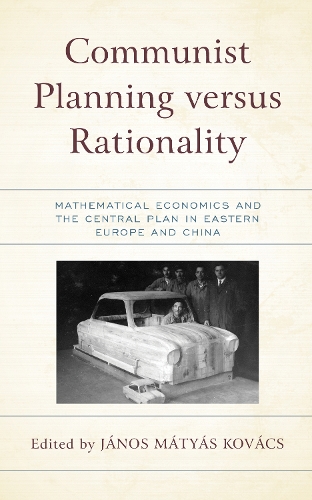
Communist Planning versus Rationality: Mathematical Economics and the Central Plan in Eastern Europe and China
(Hardback)
Publishing Details
Communist Planning versus Rationality: Mathematical Economics and the Central Plan in Eastern Europe and China
By (Author) Jnos Matyas Kovcs
Contributions by Roumen Avramov
Contributions by Andrei Belykh
Contributions by Maciej Bukowski
Contributions by Valentin Cojanu
Contributions by Kaloyan Ganev
Contributions by Julius Horvath
Contributions by Gergely Kohegyi
Contributions by Jnos Matyas Kovcs
Contributions by Xiuli Liu
Bloomsbury Publishing PLC
Lexington Books
14th April 2022
United States
Classifications
Professional and Scholarly
Non Fiction
General and world history
Far-left political ideologies and movements
Left-of-centre democratic ideologies
335.430947
Physical Properties
Hardback
424
Width 160mm, Height 228mm, Spine 36mm
794g
Description
This volume examines concepts of central planning, a cornerstone of political economy in Soviet-type societies. It revolves around the theory of optimal planning which promised a profound modernization of Stalinist-style verbal planning. Encouraged by cybernetic dreams in the 1950s and supporting the strategic goals of communist leaders in the Cold War, optimal planners offered the ruling elites a panacea for the recurrent crises of the planned economy. Simultaneously, their planning projects conveyed the pride of rational management and scientific superiority over the West. The authors trace the rise and fall of the research program in the communist era in eight countries of Eastern Europe, including the Soviet Union, and China, describing why the mission of optimization was doomed to fail and why the failure was nevertheless very slow. The theorists of optimal planning contributed to the rehabilitation of mathematical culture in economic research in the communist countries, and thus, to a neoclassical turn in economics all over the ex-communist world). However, because they have not rejected optimal planning as computopia, there is a large space left behind for future generations to experiment with Big Optimal Plans anewbased, at this time, on artificial intelligence and machine learning.
Reviews
To what extent did theories of optimality and techniques for optimization improve economic allocation under Communist rule The basic ideas turned out to have little practical applicationunder Communism, at least. Yet, at the time, the idea of an optimally planned Socialist economy attracted huge attention and intellectual efforts from East Germany and other Central and Eastern European countries to Russia and China. What was it all about This excellent collection provides many fascinating insights from a nearly forgotten chapter in the economic thought and history of eight Communist countries. There are important lessons for public policy everywhere.
-- Mark Harrison, professor emeritus, University of WarwickAuthor Bio
Jnos Mtys Kovcs is honorary professor at Etvs Lorand University, senior member at Research Center for the History of Transformations (RECET) at University of Vienna, permanent fellow emeritus at Institute for Human Sciences, and visiting professor at Central European University.
